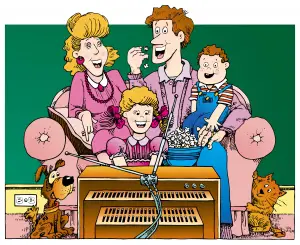This is a guest post contributed by Lisa. If you are interested in writing for Social Web Q and A, check out our write for us page.

Photo credit: ba1969
Q: What is the effect of social media on families? It seems like kids these days are glued to their gadgets; should parents be worried?
The younger generation is often portrayed in a negative light for being too engrossed by social media. While this makes for a good headline, it’s not entirely accurate, nor is it fair. First off, every generation of children has interests that fascinate them but are misunderstood by their elders.
Furthermore, given that society and business pretty much revolve around social media, it’s unfair to single out children when it’s a global consumption. Lastly, when it comes to kids and families, social media isn’t entirely evil. In fact, social media plays an important role in the lives of kids and parents alike.
Finding Acceptance
All parents worry about what their kids are doing and whether they’re being good parents. It’s very easy for parents to feel alone, especially if they fear their kids are in trouble. This is one area where social media truly helps parents.
Sites like Café Mom allow parents to share their stories with others and get honest feedback from other parents who have been in similar situations. Parents not only learn how to better understand their children, but they also have an idea of how they can behave in order to best handle the situation.
On a different scale, the reaches of the Internet can help comfort kids who are outcast from society. The Internet has message boards, forums and chat rooms for any conceivable topic, allowing even the most unique child to be understood and accepted. Every teen feels isolated to some degree, but these forums help show kids that even if they don’t fit in at school, at least they fit in somewhere.
Information Overload
Though social media can help to bridge the gaps between individuals, it’s not the two-way communication derived from an actual real-life conversation with a friend. However, the ever-changing, constantly updated paradigm of social media is attractive to many teenagers, which some parents might not understand. This is a typical example of the generation gap: kids are happy to communicate the way they see fit, whereas their parents wonder why their kids don’t want more in-person communication.
The ironic thing is, parents are often just as guilty of these social media indulgences as their children. Go to a kids’ soccer game and you’ll likely see half the parents checking their cell phones. Parents are just as addicted to their information devices as kids are, yet they hold their own children to a higher standard. Kids and parents would do well to understand each other on this issue, since this social media overuse can upset both parties.
Privacy
Facebook began as a medium for college students to converse and network, but it hasn’t remained that way. Today, hundreds of millions of people use Facebook, including parents and their children. Most teenagers use Facebook frequently and candidly, often forgetting that their parents can check their Facebook pages. Since many teens don’t tell their parents everything they do, checking on a child’s Facebook page is a good idea.
Unfortunately, doing so brings up the very important issue of trust. In a sense, by going to their kid’s Facebook page, a parent is essentially saying they don’t trust their child. Teenagers also chafe at the notion that their parents are babying them and would rather their parents respect their privacy. These teenagers have a point: if an unhappy parent were to look online for a new partner to replace his or her spouse, that parent wouldn’t want the kids to know. In this situation, parents should trust their children to make the right decisions and not resort to spying on them.
The Future
The group of parents that have teenage children didn’t grow up on Facebook or Twitter. They also likely don’t remember how lonely and boring life as a teenager can be. This confluence of technology and free time is what causes teenagers to be so enamored with social media. Since their parents didn’t grow up with these technological means, they are unable to understand what is going on with their children.
In ten years, we will see people who grew up with the Internet as parents with teenagers of their own. This group seems far more capable of understanding the way social media has changed the world and, by extension, more tolerable of their kids’ Internet use.
After all, it seems like it’s the parents who have it wrong when it comes to their kids and social media. These parents should look at their own lives and consider how social media has helped them, then apply that knowledge to understanding their children. Doing so might eliminate the gap between children and their parents, bringing them closer together.
About the Author: Lisa is an avid yoga enthusiast who enjoys writing in her spare time for SatelliteTV.com











Speak Your Mind